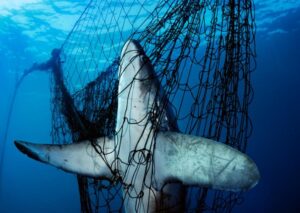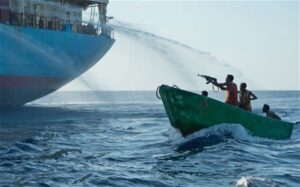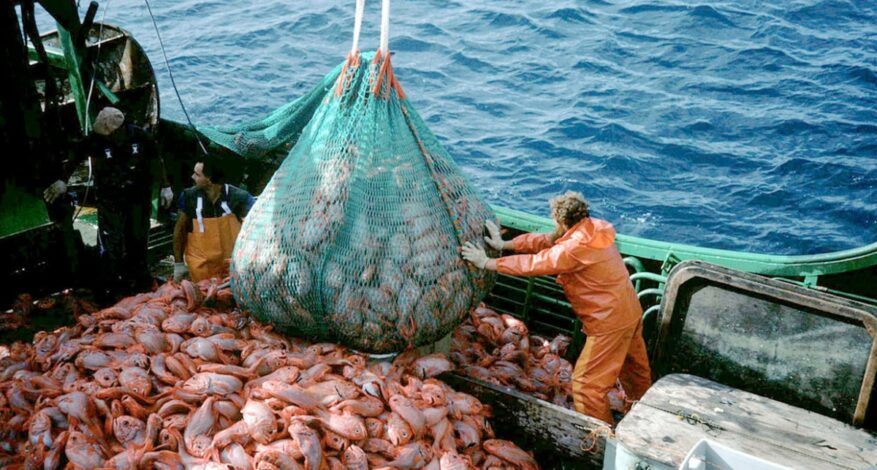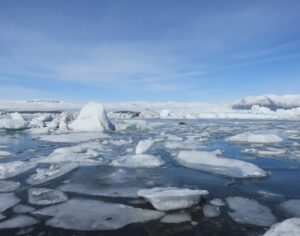A THREAT TO SEA AND HUMAN LIFE
THE PROBLEM OF OVERFISHING
Overfishing is among the activities that threaten the existence of sea life and, consequently, contribute to climate change, endangering the condition of human life. It consists of “the removal of a species of fish from a body of water at a rate that the species cannot replenish, resulting in those species becoming underpopulated in that area”.
Indeed, the intensive activity of the fishing industry in the Oceans has become one of the major drivers of the decline in ocean wildlife populations. In certain parts of the world, some species of fishes keep on decreasing every year. This decline affects the marine ecosystem and forces people to change their diets.
The FAO report of 2018 estimates that one-third of world fish stocks were overfished by 2015.
 The other point is that overfishing is closely linked with “bycatching”, which is the capture of undesired sealife (thousands of dolphins, turtles, and sharks per year) while fishing for a different species.
The other point is that overfishing is closely linked with “bycatching”, which is the capture of undesired sealife (thousands of dolphins, turtles, and sharks per year) while fishing for a different species.
Those marine animals are mistakenly captured and are eventually killed and it is often difficult to estimate how many they are.
Moreover, local communities in the poorest countries are affected by overfishing activities conducted on the high seas. When fishing in international waters the technology gap makes the difference. Therefore, those countries that have more capital to invest in the fishing industry catch more fish than poorer ones do.
Since overfishing decreases the fish catch of some local communities, many of them have started changing their diet. As a result, “wildlife hunting and bushmeat consumption have risen dramatically, leading to the alarming comeback of diseases such as Ebola”.
THE PROBLEM OF PIRACY IN THE SEAS
 However, the most serious problem is piracy. In countries as Somalia, many local fishermen have turned themselves into pirates and have become a menace for fishermen on the high seas.
However, the most serious problem is piracy. In countries as Somalia, many local fishermen have turned themselves into pirates and have become a menace for fishermen on the high seas.
Piracy is eventually difficult to trace as some ships might be dressed up as fishery vessels. What is sure is that it has become a massive humanitarian problem as it often relies on slavery, which is less traceable at seas, as it might operate under the radars, so it is hard to find out when human rights are violated if that happens far from the mainland.
POSSIBLE SOLUTIONS
The major world powers (remarkably the EU, China, the US, and Canada) could play a crucial role in reducing the impact of overfishing. In fact, they could establish new fishing quotas, closed seasons, size limits, and marine reserves in order to diminish the impact of fishing in some areas of the world.
Many reports show that, if the current trends keep evolving in the same direction, the oceans will not provide enough fish for the world’s population by 2048.
Major industries from around the world have the power to “do a U-turn” and their home countries can help tackle climate change by both protecting the sea and providing sustainable fish to their populations.
Isabel Jarrett, a journalist at IPS Journal, argues that, as China and the EU aim at being carbon neutral within 30 years, they could advocate for the regulation of fuel subsidies to fishing vessels as part of a WTO agreement to end harmful fisheries subsidies.
In fact, fuel subsidies reduce the costs of fishing and contribute to the unsustainable and exploiting activity carried out at the expense of the sea. Also, fuel subsidies allow ships to reach locations that are beyond their national waters and to fish in the high seas or in other countries’ waters.
Assailing ships far from national waters is not so profitable without subsidies, this measure might turn out to be very useful.
THE UN ENVIRONMENT PROGRAMME
Thanks to the UN Environment Programme (UNEP), a report was drafted to encourage governments to forbid excessive subsidies to fishing activities. This is a strong signal that points out the importance of cooperation when dealing with such controversial issues.
What is certain is that the equilibrium of the marine ecosystem is fundamental for the future of our planet so the international community should not forget about oceans.
Environmental problems are global in size and shape; they involve all humanity regardless of State borders.
Therefore, to deal with the environmental degradation we have no other choice but to cooperate, and reducing intensive fishing activities around the globe is a significant part of the work that needs to be done. The answer must be proportionate to the challenge.
Fighting against fuel subsidies is a great start, but what we really need is an international agreement that provides a more accurate definition of overfishing and that identifies what the national governments should do to reduce the damage that has been done by intensive fishing activities. This is what everybody and everything living on this planet deserve and should witness in the forthcoming future.






